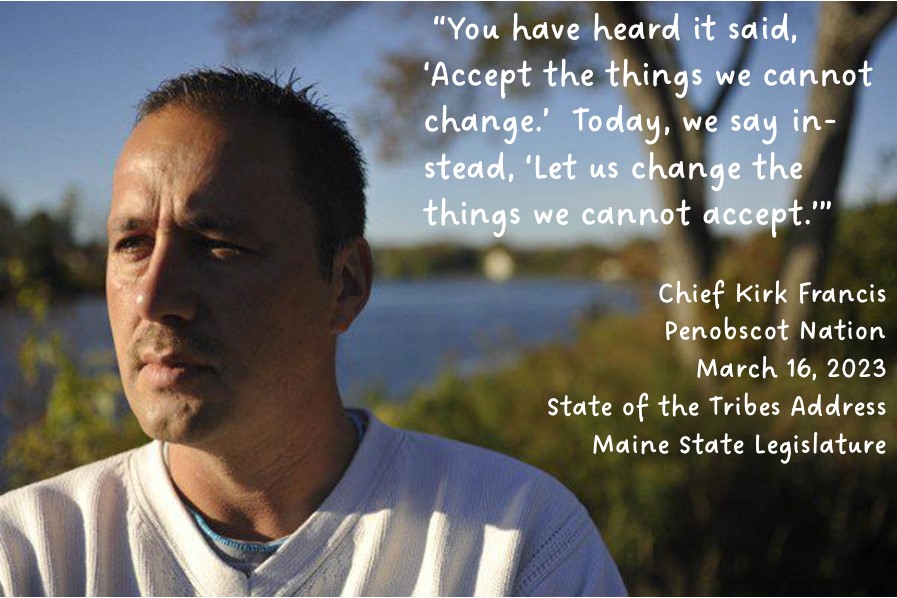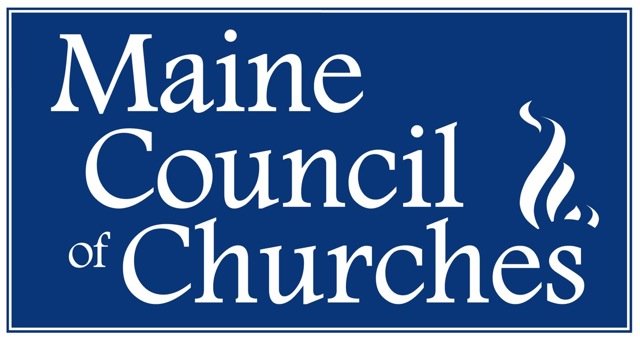Changing the Things We Cannot Accept

Lent 4

Last Thursday, hundreds of people came to the State House in Augusta for an historic event: the Chiefs of the Wabanaki tribes delivered the first State of the Tribes address in more than 20 years. They spoke to a joint session of the Maine State House of Representatives and Senate and their honored guests. Click HERE to watch the video recording.
While there were many notable moments and each speech was inspiring, one quote from Penobscot Chief Kirk Francis was particularly memorable for me: “You have heard it said, ‘Accept the things we cannot change.’ Today, we say instead, ‘Let us change the things we cannot accept.’”
Chief Francis was, of course, quoting the well-known Serenity Prayer:
God, grant me the serenity
to accept the things I cannot change,
the courage to change the things I can,
and the wisdom to know the difference.
The prayer is by Lutheran theologian Reinhold Niebuhr—though it was his student at Union Theological Seminary in New York City, Winnifred Crane Wygal, who recorded his words in her class notes and first circulated them as a prayer in 1933 (always clear that Niebuhr, not she, was the author).
Maybe that’s why Chief Francis’ quote stuck with me—I am a fiercely loyal alumna of Union!
But I think it’s more than that. It’s also because his twist on the familiar prayer resonates for me as a guidepost for faith-based advocacy for justice, compassion and peace (part of the mission of the Maine Council of Churches). Let us change those things we cannot accept.

In the assigned gospel reading for the fourth Sunday in Lent (John 9), we hear the story of how Jesus healed a man who had been blind since his birth. One day, as Jesus and his disciples were walking along, they saw the blind man, and the disciples asked, “Who sinned, this man or his parents?” In those days, it was a common belief that illness and disability were punishments from God for sin. Jesus corrects their faulty theology: “No one sinned.” Then he spat on the ground and made mud with the saliva, spread the mud on the man’s eyes, and said to him, “Go, wash in the pool of Siloam” (which means Sent). The man went and washed and came back able to see.
Coincidentally, this gospel lesson was the very first assignment in the very first preaching class I took at Union. Our professor, Rev. James Forbes, told all sixty of us students we were each to write a five-minute sermon on the text, which we would then have to preach in front of the class. I immediately did the math—good God! I’m going to have to listen to 59 sermons all on the exact same scripture passage—how painfully boring and repetitive! I was wrong. Not one of the sixty sermons was the same as any other—each was unique in its focus, its technique, its message.
Those sermons did have one thing in common, though—every one of us student preachers accepted without question that Jesus had no problem changing the things he could not accept. He changed his disciples’ interpretation because he could not accept that anyone would lay blame on the blind man or his parents for a disability that wasn’t their fault. He could not accept the theological premise that God, who is Love, would punish someone by striking them blind (or striking their child blind).
Of course, this season of Lent is a sober reminder that Jesus’ courage to change the things he could not accept eventually enraged and threatened those in power so much that they took him out to the Place of the Skull and executed him.
And then God said… “Let us change the things we cannot accept.” So that Good Friday, death did not have the last word. And on Easter morning, Love won.
Thanks be to God.

